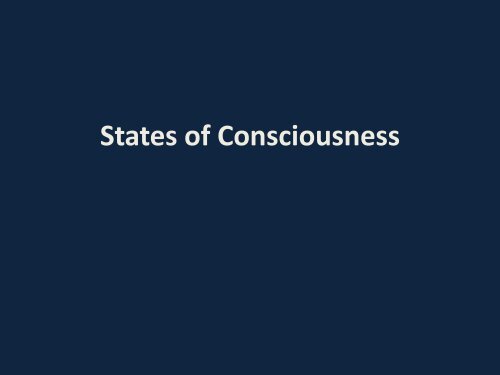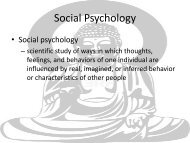Psych 1101 Chapter 3 Consciouness - PUNK ROCK PSYCHOLOGY
Psych 1101 Chapter 3 Consciouness - PUNK ROCK PSYCHOLOGY
Psych 1101 Chapter 3 Consciouness - PUNK ROCK PSYCHOLOGY
- No tags were found...
You also want an ePaper? Increase the reach of your titles
YUMPU automatically turns print PDFs into web optimized ePapers that Google loves.
States of Consciousness
What is Consciousness?• Consciousness has been defined bypsychologists as our awareness ofourselves and our environment.• The awareness varies depending onour attention to the task at hand. Ex:driving.
Consciousness and InformationProcessing• Consciousness describes what we are aware ofbut many things are processed outside of our“consciousness.”• Difficult or novel tasks require more consciousattention than well learned tasks.• Consciousness has a limited capacity
Daydreams and Fantasies• Almost everyone daydreams at one point oranother.• Young adults tend to fantasize more than olderadults, and admit to more sexual fantasies.• Although 95% of all people have sexualfantasies, men tend to fantasize more thanwomen.• Fantasy-prone personality: someone whoimagines and recalls experiences with lifelikevividness and who spends considerable timefantasizing.
Why Might Daydreaming Be Helpfuland Adaptive for Humans?• A way to escape• Prepare for future events• Aware of unfinished business• Increase creativity• Substitute for impulsive behavior
Biological Rhythms• Biological Rhythms: periodicphysiological fluctuations built intohuman beings.• Ex: 28 day menstrual cycle, 24hour alertness cycle, annual cycle,90 minute sleep cycles.• Circadian Rhythm: biological clockthat regulates body rhythms on a24 hour cycle….larks vs. owls.
Is P.M.S. A Myth?!?• “Premenstrual Syndrome:” feelings of increasingtension and stress that occur before onset ofmenstruation.• Human tendency to remember instances thatconfirm our beliefs.• Placebos work the same• Sadness, lethargy, irritability, headaches, insomnia
Sleep• Sleep: refers to the periodic, natural,reversible loss of consciousness.• Using an EEG, sleep researchers have shownthe mind is “awake” during various stages ofsleep.
Sleep Stages: Stage 1• As we lay with our eyes closed we are in an awakebut highly relaxed state characterized by alphawaves (slow waves) being emitted from our brain.• As we fall asleep, we have a 50% decrease in alphawave activity…sometimes referred to as “drowsysleep.”• During Stage 1 sleep, we often experiencehallucinations: false sensory experiences. We mayfeel a sensation of falling or floating.• 5 minutes
Second Stage: Sleep Spindles• After about 5 minutes in stage 1 sleep, you sleepinto Stage 2 sleep which is characterized by SleepSpindles: bursts of rapid, rhythmic, brain waveactivity.• Stage where you are clearly asleep, sleep talkingcan occur in this stage or any other later stage.• 20 minutes
Stage Three: Transition Stage• Stage Three begins your descent into “slow wavesleep.”• Delta Waves: (large, slow brain waves associatedwith deep sleep) begin appearing in stage 3 but areincreasingly apparent in Stage 4.
Stage Four: Delta Waves• Stage of deep sleep characterized by DeltaWaves.• Stage when you are hard to awaken…but stillaware of stimuli around you.• Stage at which children may wet the bed orsleep walk.• Also experience night terrors.
Night Terrors• Occur during late stage 4 sleep and arecharacterized by high arousal and anappearance of terror but are seldomremembered.
R.E.M. Sleep (Paradoxical Sleep)• After stage 4, yourbodies cycles back tostage 3, stage 2, and intoREM sleep.• A Normal Sleep cyclelasts about 90 minutes.
R.E.M. Sleep (Paradoxical Sleep)• R.E.M.: rapid eye movement sleep, stage wherevivid dreams occur. Known as Paradoxical becausemuscles are relaxed yet body is highly active.• Heart rate increases, Breathing more rapid, eyesdart behind lids.• Genitals become aroused during R.E.M. sleep evenwhen dreams are not sexual in nature.• As sleep cycle continues, R.E.M. sleep gets longerand longer.
Brain Waves and Stages of Sleep
So Why Do We Sleep?• Most of us would sleep for 9 hours if we could• Sleep debt• Decrease in work productivity• Increase in auto accidents• Suppressed immune system• Alter metabolic and hormonal functioning• Decrease in performance and creativity
Sleep Function• Theories:• 1. Sleep protects• 2. Helps us recuperate• 3. Might help us grow
Sleep Deprivation
Sleep Disorders• Insomnia: inability to fallasleep or stay asleep.• 10-15 % of adults• Sleeping pills and alcoholmight make it worse– Less REM sleep
Sleep Disorders• Sleep Apnea: sleep disordercharacterized by a temporarystoppage of breathing during sleepand consequent momentaryawakenings.• Often complained about as“snoring.”• Often interrupts deep sleep stagesleaving person feeling exhausted.
Tips for Sleeping1. Relax before bed2. Avoid caffeine3. A glass of milk4. Regular cycle5. Exercise regularly,but not in the late evening
Dreams
What’s the Meaning Of Dreams? Depends WhoYou Ask!• <strong>Psych</strong>oanalytic Theorists like Freud will argue that dreamsrepresent the royal road to the “unconscious.” Dreamsrepresent unresolved wishes/desires and dischargefeelings that would be unacceptable if consciously voiced.• Sigmund Freud- The Interpretation of Dreams (1900)– wish fulfillment– discharge otherwise unacceptable feelings• Manifest Content: represents remembered story line of adream.• Latent Content: represents underlying meaning of dreamsdealing with wishes and drives.
What’s The Meaning of Dreams?Depends Who You Ask?As Information Processing– Helps consolidate the day’s memories– Stimulates neural development
What’s The Meaning of Dreams?Depends Who You Ask?• Physiological Function of Dreams: periodic brainactivity associated with R.E.M. sleep gives the brainneeded activity to make neural connections. Alsohelps facilitate memory.• Activation-Synthesis Theory: dreams are result ofbrain’s attempt to make sense of random neuralactivity. Visual cortex among other areas like theLimbic System are active during R.E.M. sleep. Mindalways tries to make sense of stimuli.
What’s The Meaning Of Dreams?Depends Who You Ask!• Dreams As Part of Cognitive Development: allmammals experience R.E.M. sleep and manyresearchers believe it helps facilitate cognitivedevelopment.• R.E.M. Rebound: tendency for R.E.M. sleep toincrease following deprivation. May illustrate abiological need for it.
Lucid Dreams• Lucid Dreams: are dreams in which youbecome aware that you are dreaming and youcan control aspects of your environment in thedream.
What do we dream about?• Sex- 1 in 30 for women;1 in 10 for men• Women dream about men and women; 65% ofmen's dreams are about men• Most dreams are about events in our daily livesPrevious day’s experiences• Forget things that happen 5 minute before we fallasleep• Do not remember taped info
Have you ever dreamed of…..?• Falling 83%• Being attacked 77%• School, teacher, studying 71%• Sexual experiences 66%• Arriving late 64%• Eating 62%• A loved person dying 57%• Being locked up 56%
Have you ever dreamed of…..?• Finding money 56%• Swimming 52%• Snakes 49%• Being inappropriately dressed 46%• Unable to breathe 44%• Being nude 43%• Fire 41%• Failing an Exam 39%• Killing Someone 26%
Hypnosis
Hypnosis•• Hypnosis- a social interaction in which oneperson ( the hypnotist) suggests to another(the subject) that certain perceptions,feelings, thoughts or behaviors will occur
HypnosisCan anyone Experience Hypnosis?• It depends on the subject’s openness tosuggestion
HypnosisCan Hypnosis Enhance Recall of ForgottenEvents?• Hypnosis does not help us recover “accuratememories as far back as birth”• Highly hypnotizable ppl are especiallyvenerable to false memory suggestions
HypnosisCan hypnosis force people to act against theirwill?• An authoritative person in a legitimate contextcan induce people- hypnotized or not- toperform some unlikely acts
Can Hypnosis Alleviate Pain• YES• 10% of us can become so deeply hypnotized thateven major surgery can be performed withoutanesthesia• Dissociation- a split between levels ofconsciousness.• Dissociate the sensation of the pain from theemotional suffering• Selective Attention
Is Hypnosis an Altered State ofConsciousnessHypnosis as a social phenomenon• Behaviors produced through hypnoticprocedures can also be produced withoutthem• People do what is expected of them
Is Hypnosis an Altered State ofConsciousnessHypnosis As A Divided Consciousness• Explains hypnosis not as a unique “trance state”where the “subconscious” is under control bythe hypnotist but rather as a split in awarenesscaused by the “subjective experience ofhypnosis.”• Hilgard’s Experiment
Perspectives On Dissociation
Hilgard’s Hidden Observer• Hidden Observer: describes hypnotizedsubject’s awareness of experiences, suchas pain, that go unreported duringhypnosis.–Is a part of the person that has theexperience.
Hypnosis Concepts: Can HypnosisHave an Effect After The Session?• Posthypnotic Amnesia: supposed inability to recallwhat one experienced during hypnosis; induced bythe hypnotist’s suggestion. “You will no longerremember anything you experienced today.”• Posthypnotic Suggestion: a suggestion made duringa hypnosis session that will be carried out afterhypnosis session is over. “You will no longer feel theneed to smoke after this session is over.”
Near Death Experiences
Near Death Experiences• Near Death Experiences: an altered stateof consciousness reported after a closebrush with death.
Dualism• Dualism: argues that the mindand body are two distinct entitiesthat interact. The “mind” isnonphysical and can exist apartfrom the physical body.• Was put forth by manyphilosophers including ReneeDescartes and Socrates.
Monism (Materialism)• Monism argues that the mind and bodyare different aspects of the same thing.• Mind and body cannot be separatedwithout bodies we are nobodies.• Thomas Hobbes along with manyphilosophers and scientists support thisviewpoint.
Drugs• Drugs are chemicals that have biological effectswithin the body.• <strong>Psych</strong>oactive drugs are chemicals that changeconscious awareness or perception.– Depressants slow down the nervous system.– Stimulants speed up the nervous system.– Opiates relieve pain.– Hallucinogens alter sensory perception .
Drug Use and Abuse• Drug abuse: Drug use that causes emotional orphysical harm to the user.• Addiction results from repeated drug use.– Tolerance: more drug is required.– Drug abstinence leads to withdrawal symptoms.• Drug dependence can be:– Physical: withdrawal reactions are noted whendrug use is terminated.– <strong>Psych</strong>ological: associated with a craving for thedrug
Examples of Drug Types• Depressants:alcohol, barbiturates• Stimulants:caffeine, amphetaminecocaine, nicotine• Opiatesheroin, morphine• HallucinogensLSD, mescaline, marijuana
Depressants• Alcohol is particularly dangerous whencombined with barbiturates.– abuse can lead to serious losses in cognitivefunctioning– involved in nearly half of all murders, suicides,spousal abuse and accidental deaths in the unitedstates– is the third leading cause of birth defects
Stimulants• Nicotine is considered the single mostpreventable cause of death and disease in theUnited Sates.• Cocaine causes physical damage, severeaddiction and psychological dependence.– Cocaine can interfere with the electrical activity ofthe heart.
Opiates• Narcotics, such as morphine and heroin,produce their effects by mimickingendorphins.
Hallucinogens• LSD- associated with “bad trips”• Marijuana has some properties ofdepressants, narcotics and hallucinogens athigher doses.
“Club Drugs”• MDMA- high doses can cause dangerousincreases in body temperature and bloodpressure leading to seizures, heart attacks andstrokes; can produces long lasting damage tothe brain.
How Drugs Work
Drug Action on Neurons
Factors that Lead to Drug Abuse• Positive associations: the drug is portrayed in apositive fashion in the media.• Biological factors: the drug induces a pleasurablestate (usually related to dopamine activity in thebrain).• Prevention of withdrawal: person continues totake the drug to avoid withdrawal effects.• Conditioning of drug craving: cues associated withdrug use can elicit craving for the drug.



